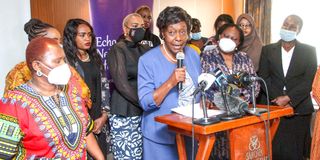Women must shun the conduct of stereotyping female politicians

Kitui Governor Charity Ngilu (holding microphone) with other women leaders address journalists on the Building Bridges Initiative at a Nairobi hotel in October, last year.
What you need to know:
- Charity Ngilu, the second governor of Kitui County and one of the two elected women county bosses, thrust herself into Kenya’s presidential race after being in politics for barely five years.
- Ms Martha Karua, the long serving MP for Gichugu, a former minister in the Kibaki administration and the Narc-Kenya party leader, made a go at the highest office, in the 2013 General Election.
- Although more women are now moving to top management roles in other sectors, indications are clear that the journey to high – specifically elective political office, is still replete with thorns.
Charity Ngilu, the second governor of Kitui County and one of the two elected women county bosses, thrust herself into Kenya’s presidential race after being in politics for barely five years, as an MP, and after only one parliamentary term.
The then Kitui Central MP, alongside the late Prof Wangari Maathai, made history with the – no doubt courageous and daring move – to become the first women in the country to contest the presidency – for years an exclusive boys’ club.
This was in the 1997 General Election that saw Ms Ngilu emerge an impressive fifth, to beat among others, veteran politician Martin Shikuku of Ford Asili, in the contest predictably won by Kanu’s incumbent, the late Daniel Arap Moi.
Prof Maathai came 13th in the crowded race of 15 candidates. Although hers has since been a consistence rise in the political leadership, holding Cabinet positions in the successive administration of Presidents Mwai Kibaki and Uhuru Kenyatta (after 2013 elections) – and now governor, Ms Ngilu is yet to attempt the presidency again.
Likewise, Ms Martha Karua, the long serving MP for Gichugu, a former minister in the Kibaki administration and the Narc-Kenya party leader, made a go at the highest office, in the 2013 General Election. She was the only woman in the ring of eight candidates.
Elected female governor
In the 2017 elections, Ms Karua returned to her Kirinyaga home county, contested the governorship and lost to Ms Anne Waiguru – the other elected female governor – in a closely contested race. Ms Karua disputed the results and unsuccessfully challenged them up to the Supreme Court.
In November last year, however, she won a reprieve at the Arusha-based East African Court of Justice and was awarded Sh2.7 million in damages for violations of her rights to a fair hearing in the petition.
Nairobi’s Anne Kananu Mwenda, was sworn in as the deputy governor last month, to replace impeached Mike Mbuvi Sonko. He had nominated her as his deputy before he was pushed out of office through a no-confidence vote by the Nairobi County Assembly.
This is just but a brief summary of recent history that tells of the struggles as well as experiences and of course resilience, of some of the most outstanding Kenyan women in the country’s male-dominated field – as they seek to fight their way to the nation’s top political echelons and leadership.
Elective political office
Although more women are now moving to top management roles in other sectors, indications are clear that the journey to high – specifically elective political office, is still replete with thorns. This reluctance to level the political field to ensure fair competition of women and men is what makes many Kenyans of goodwill – especially women – be deeply sceptical that there will be gender parity in the country’s politics.
As Kenya’s women battle for political space and top positions in politics, however, it is important for them to celebrate and support those already, or on their way up, after defying many odds to achieve that feat. That support – moral or otherwise – by fellow women, is critical in encouraging those who intend to join politics to do so, with the knowledge that a sister will be present to not only egg them on, but to also give a shoulder to cry on.
Similarly, most of those already in positions will without a doubt, do with the encouragement, support and even mentorship of fellow women, to keep moving on.
That is why women should keep away from the common conduct of stereotyping leaders of the female gender, especially those in politics. This, however, is not to say that women should not criticise their own when they stray as leaders. Asking that of women is undemocratic and amounts to suppressing their voices.
Gender parity
It is also undemocratic – and this is very common, when leaders – in explaining away the low number of elected women in Parliament and County Assembly, take to a blanket blame of women voters “who are the majority, and cannot elect their own’’! Women, like all other Kenyans, are entitled to vote for candidates of their choice, irrespective of the gender.
Instead, as Kenyans, we must support women leadership by electing those qualified to the position. In the meantime, history has taught us that when women are not elected and appointed to political office, political decisions made do not sufficiently serve the needs and inclinations of the female gender.
That is why women leaders and those who support the course of gender parity must learn to reject and keep voicing out against the notion that women are to be “given” positions. Women and men are equal in the eyes of Kenya’s Constitution.
Njeri Rugene, a journalist, is founder and executive director, The Woman’s Newsroom Foundation. [email protected]





